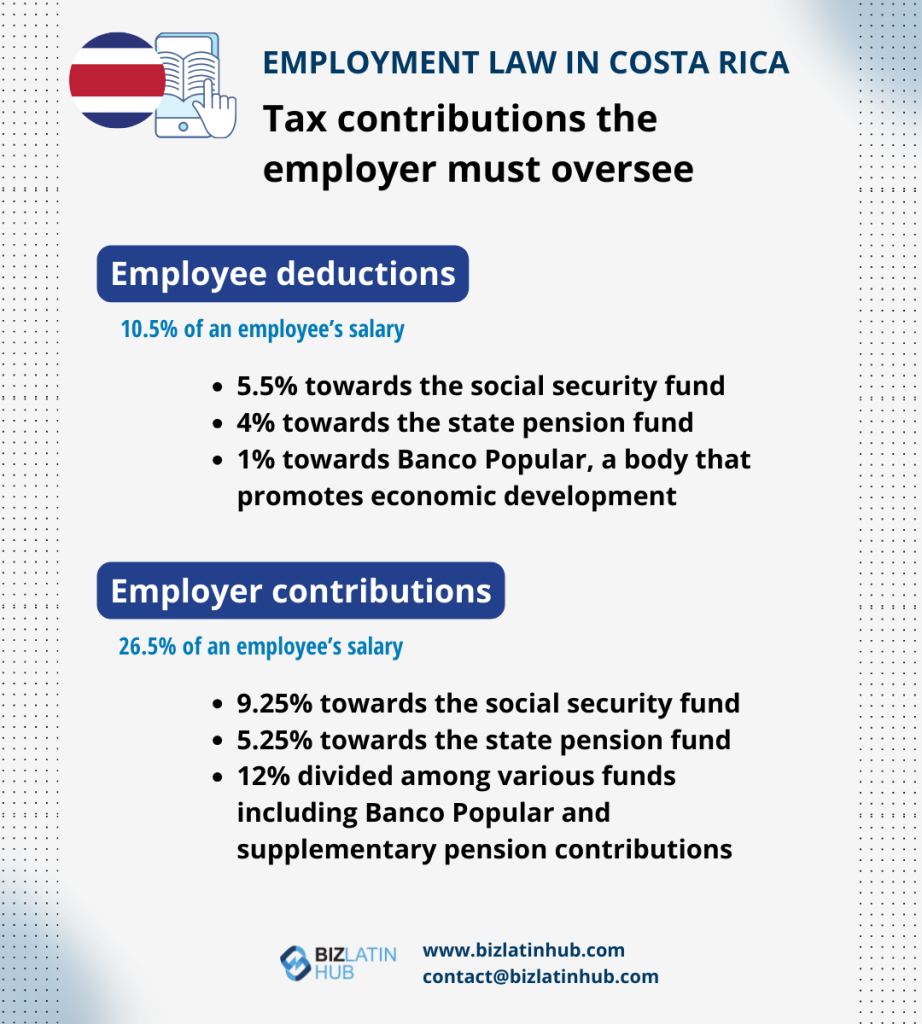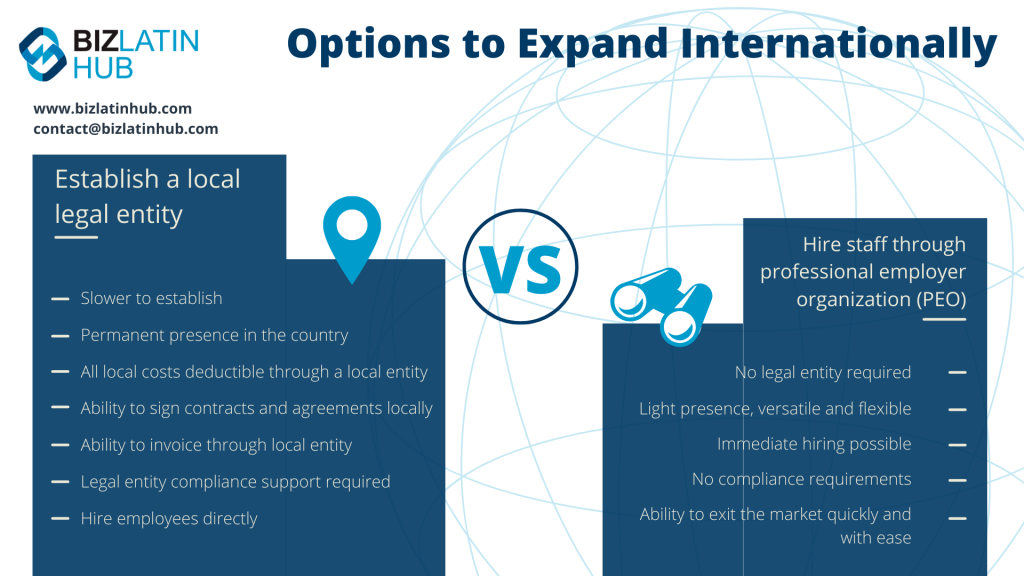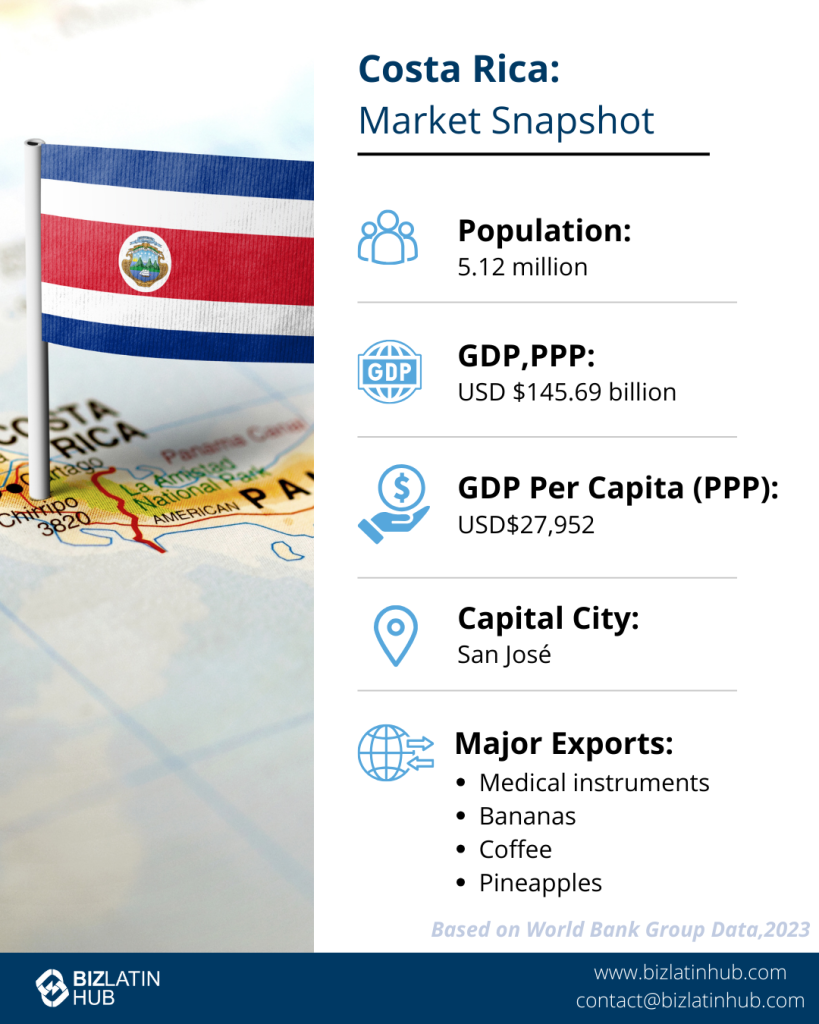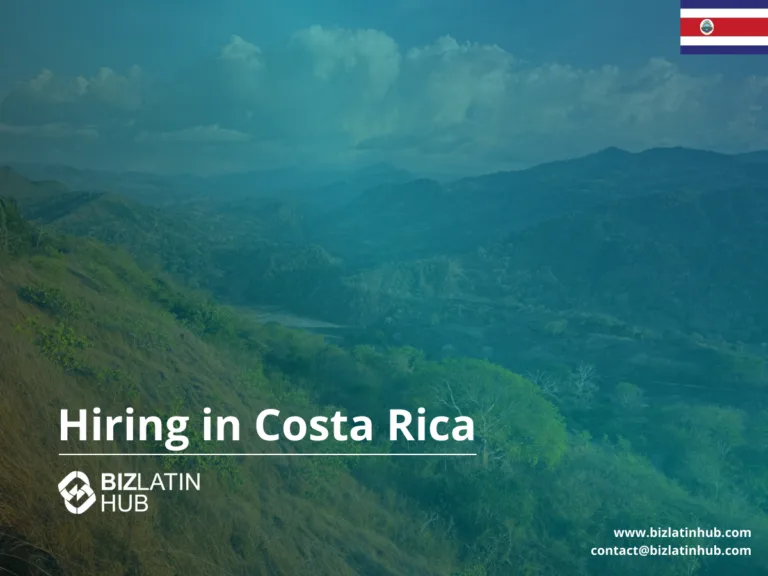After company formation in Costa Rica, you will need to find employees. However, this is not always easy for a new entrant to the jurisdiction, meaning you should seek specialist advice. A good recruiter in Costa Rica will have expert knowledge of the local market and an established recruitment network to tap into, so should be able to find strong candidates quickly. If hiring in Costa Rica interests you, the following article offers an overview of the market and advice on the key sectors to investigate.
Key takeaways on hiring in Costa Rica
| What are the key sectors in Costa Rica? | Key sectors in Costa Rica include IT/Technology. Real Estate. Operations and Logistics. Manufacturing. Communication Services. |
| Steps to hiring in Costa Rica | A local advisor can help you with: Job adverts Networking CV assessment Interviewing Contract writing Onboarding |
| Is PEO legal in Costa Rica? | PEO in Costa Rica is fully legal. |
| What is the minimum wage in Costa Rica? | The current minimum wage as of January 2025 varies widely depending on sector from CRC$367,108 to CRC$784,139 (aprox USD$725-$1,550). |
| What are the employer contributions in Costa Rica? | 26.5% must be paid of an employee’s gross salary. |
What sectors are best for hiring in Costa Rica?
Technology-related roles will continue to be the main driver of demand globally, according to the Manpower study. This rings true for hiring trends in Costa Rica.
The sectors seeking to increase their staffing numbers include:
- IT/Technology.
- Real Estate.
- Operations and Logistics.
- Manufacturing.
- Communication Services.
- Office Administration.
- Customer Service.
- Human Resources.
Costa Rica still has large and flourishing sectors in the traditional economy, especially agriculture, tourism and manufacturing. But in the so-called ‘Industry 4.0’ economy, the Costa Rican IT and technology sector is seeing explosive growth and is pushing hiring trends in Costa Rica among young professionals.
Top 5 reasons why IT/tech is driving hiring trends in Costa Rica
The top 5 reasons why IT is driving hiring trends in Costa Rica are:
- Highly-educated labor pool.
- High fluency in English.
- Strong FDI in the tech sector.
- Lower labor/staffing costs.
- Similar time zones to North America.
1. Highly-educated labor pool
Perhaps the principal reason why hiring trends in Costa Rica remain so robust. The country is known for having the best education system in the region, meaning young tech professionals are highly educated. In terms of tech skills, Costa Rican software developers are ranked among the best in the world.
2. High fluency in English
For foreign companies that incorporate in the Central American nation – or companies that hire tech talent to work on projects remotely – there’s little need to involve a translator. That’s because Costa Rica ranks second in all of Latin America in terms of English-speaking ability.
3. Strong FDI in the tech sector
Costa Rica’s business-friendly Free Trade Zones have seen 20 companies on the Fortune 100 list – such as Intel, IBM, HP and others invest heavily in the Central American nation. These firms encourage high school and university students to pursue careers in the IT/technology field.
4. Lower labor/staffing costs
Cost savings is, after all, why US companies are looking to Latin America in general, and Costa Rica in particular, for tech talent. For what it costs to hire a software developer in the US, companies can hire 3 software developers in the country. Keeping labor costs low is another main driver of hiring trends in Costa Rica.
5. Similar time zones to North America
Costa Rica’s time zone is the same as Central Time in the US for six months of the year; the other six months it’s just one hour behind. This means that US-based tech teams can teleconference with their Costa Rican counterparts at roughly the same time of the work day.
How much it costs to hire people in Costa Rica

The cost of hiring in Costa Rica is less than it would be in richer nations, yet workers are often well qualified and skilled. With significant investment in education over a number of years, the Costa Rica now has a surfeit of graduates in the labor market that it cannot provide local jobs for. This means that the labor market in Costa Rica is relatively competitive for an incoming prospective employer.
The minimum wage in Costa Rica as of January 2025 varies widely depending on sector from CRC$367,108 to CRC$784,139 (aprox. USD$725-$1,550). However, this is not necessarily the rate that you should be offering. In top sectors that require qualified and skilled workers, you will need to offer at least market standard rate. A local hiring expert in Costa Rica will be invaluable in making sure that you are not overpaying or offering unattractive rates that make it hard to recruit quality talent.
Employers in Costa Rica must make social security contributions equal to 26.5% of an employee’s wage. The employer must withhold tax at a rate of 10.5% of an employee’s remuneration.
Two options for hiring: establish a company or PEO
When entering the market and hiring in Costa Rica, there are essentially two options available to investors and entrepreneurs. The most common way of doing so is through full company formation to establish a presence in the jurisdiction. However, this may take time and effort, meaning that it is worth considering another option as well, using a Professional Employer Organization (PEO).
PEO: fast and agile
A Professional Employer Organization (PEO), also known as a ‘Registered Employer’ or ‘Employer of Record’, is an organization that provides and supports companies with their human resources functions, from the early stages of recruitment to the payment of taxes and benefits. PEOs undertake the fundamental and time-consuming tasks of human resources teams, allowing companies to focus on the growth and success of their business.
The services of a PEO are particularly useful when businesses seek to hire a local workforce but do not wish to establish a local legal entity. Simply put, a PEO makes it easy to hire staff in Costa Rica through an outsourced provider. It means you can enter the market and start hiring quickly, without having to commit to full entry until you are sure that it is what you want to do. It is worth noting that regionally there is beginning to be more regulation and PEO in Costa Rica may not be viable in the future.

The long-term option: direct hiring
This is the gold standard of hiring in Costa Rica, as it will give you full control over your employees as well as being sure that you will be compliant for the long term. It also gives you a higher status with potential job applicants, who will see you as a more secure long-term employer.
Before you start hiring employees in Costa Rica, you will first need to get a sense of the legal, financial and cultural lay of the land. Things such as how to sort out the red tape associated with incorporation and how to manage payroll, for example. With a permanent legal presence in Costa Rica, you will be fully liable for compliance with local law.
A local expert will help when hiring in Costa Rica, as they will have an extensive network of qualified professionals for top jobs as well as a good idea of the local labor market. They will be able to advise on the best rates to offer and what type of profile you should be targeting. With anti-discrimination legislation important in Costa Rica, especially for top jobs, they can make sure you are making a fair offer which complies with local law.
After placing adverts and receiving applications, you will want to move towards interviewing potential candidates. This should be done by both a team manager and HR representative at minimum, to make sure that everything is watertight in legal terms. You may want to include other people into the process in order to make a better assessment of the candidate.
It is entirely possible that you may wish to have a second interview, possibly involving other team members as discussed above. It is also common in the region and when hiring in Costa Rica to provide candidates with an aptitude task to be completed. This usually takes the form of a dummy task that simulates the type of job that will be done in the future and confirm that they possess the skills cited on their CV.
Contracts, too, will be important. A local advisor will be up to speed on what you can and cannot offer. Bear in mind that you will have to follow all the rules established by Costa Rica. In Costa Rica, this includes Temporary and regular employment. The former can only be granted under specific circumstances and cannot last more than a year.
Finally, your local advisor will be able to help you with the stages of both the hiring and onboarding process. They will make sure that you comply with standard requirements such as compulsory medical checks and make sure that any probation period is within the boundaries of those established by the labor law in Costa Rica. This is generally up to three months.
Labor laws and regulations in Costa Rica
Before making a move into the jurisdiction, it’s important for companies to understand the labor rights and responsibilities of both employers and employees in Costa Rica. What follows are a few things that foreign business owners should know about when it comes to the local work culture:
- Work hours – The standard workday in Costa Rica is eight hours, with the standard workweek up to 48 hours.
- Public holidays – There are 11 public holidays in Costa Rica each year but two are unpaid.
- Vacation time – Workers in Costa Rica are eligible for two weeks of vacation annually. Women are entitled to four months’ maternity leave.
- Contract types – There are essentially two types of contract in Costa Rica, regular employment and temporary employment

FAQs on hiring in Costa Rica
Based on our extensive experience these are the common questions we receive from clients when looking to hire in Costa Rica.
1. Why hire talent in Costa Rica?
Hiring in Costa Rica offers access to a large talent pool that is located in the same time zone as the North American market, is culturally similar, and is more economical. The combination allows a company to complement an existing North American based team or to establish an independent nearshoring center within the region.
2. Can I hire top talent in Costa Rica?
Yes, you can hire top talent in Costa Rica, often at more competitive prices than in your local market.
3. What is the level of English for professionals in Costa Rica?
The level of English in Costa Rica may not be the highest, but in key white collar sectors it is much better. University graduates are expected to complete English language proficiency to at least an intermediate level.
4. How many software developers are there in Latin America?
The Association of Computer Science and Information Technology states that there are over 2 million tech professionals within Latin America.
Biz Latin Hub can help you with hiring in Costa Rica
At Biz Latin Hub, we offer a comprehensive range of market entry and back-office solutions across Latin America and the Caribbean.
With offices in key cities across the region, along with trusted partners in other markets, our extensive reach makes us well-suited to support cross-border operations and multi-jurisdiction market entries.
As well as knowledge about hiring in Costa Rica, our portfolio of services includes hiring & PEO accounting & taxation, company formation, bank account opening, and corporate legal services.
Contact us today to find out more about how we can assist you in finding top talent or otherwise doing business in Latin America and the Caribbean.
If this article on tips for hiring in Costa Rica was of interest to you, check out the rest of our coverage of the region. Or read about our team and expert authors.




